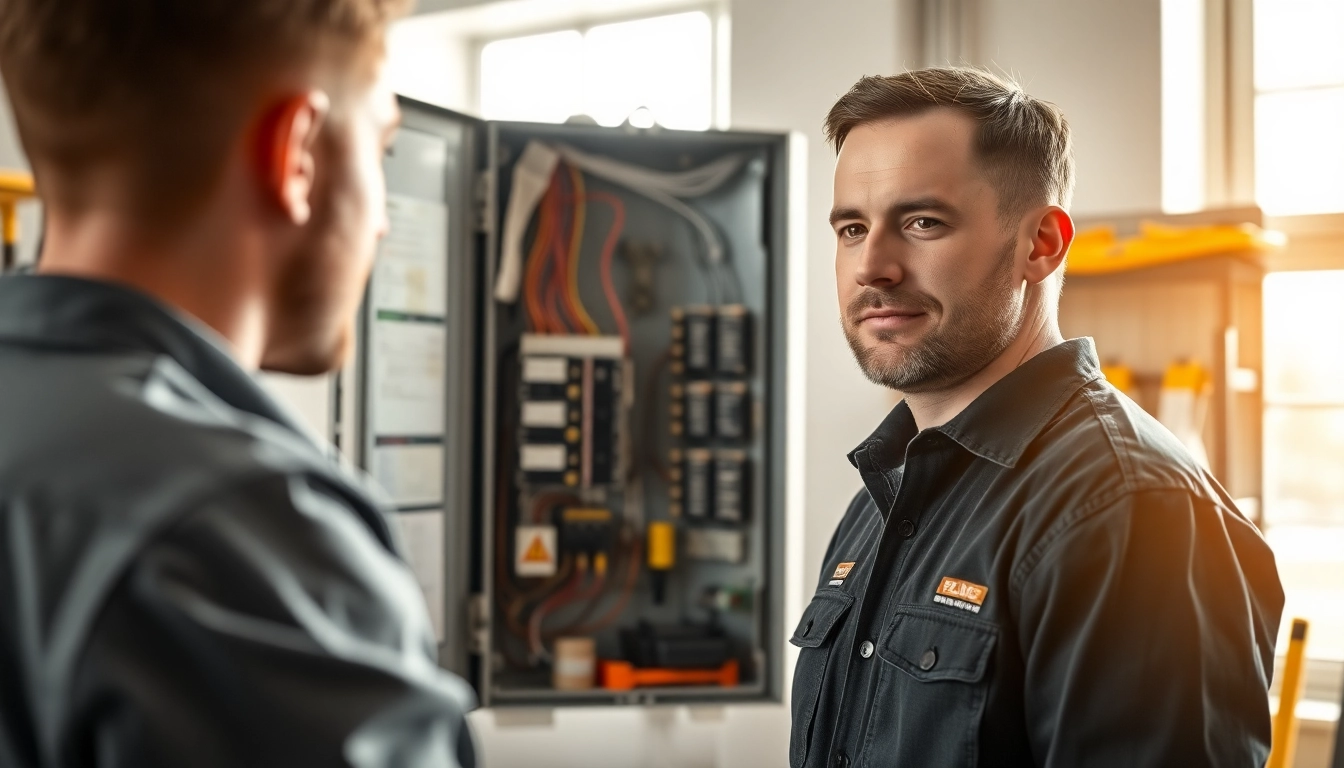
Understanding Electrical Panels
When it comes to maintaining the safety and efficiency of your Clearwater home, a crucial element that often goes overlooked is the electrical panel. The electrical panel serves as the heart of your home’s electrical system, controlling the flow of electricity and distributing it throughout your residence. In Clearwater, where energy demands can fluctuate, understanding when and how to upgrade your electrical panel can save you time, money, and potentially, your family’s safety. For an insightful exploration into key considerations for electrical panels, refer to Electrical Panel Clearwater.
What is an Electrical Panel?
An electrical panel, often referred to as a breaker box or service panel, is the point where electricity enters your home. This essential component houses circuit breakers that protect your home from electrical overloads and short circuits. Essentially, it divides the electrical power feed into subsidiary circuits while providing a protective fuse or circuit breaker for each circuit in a safe and orderly manner.
Components of an Electrical Panel
The vital components of an electrical panel include:
- Main Breaker: This controls the power supply to your entire home, allowing you to shut off electricity if needed.
- Circuit Breakers: These are switches that automatically shut off an electrical circuit to prevent overload. Each circuit is designed to handle a determined load to avoid tripping.
- Bus Bars: These are metallic strips that distribute electrical power to the individual breakers.
- Subpanels: These are secondary panels that can handle additional circuits, typically added for specific areas of the home.
How Electrical Panels Function in Clearwater Homes
In Clearwater, electrical panels play a pivotal role, particularly given the region’s humidity and frequent thunderstorms. These panels help regulate electricity efficiently, protecting household appliances and systems from surge damage. Moreover, they are crucial for ensuring that your home meets the electrical code standards set by local authorities, which helps maintain safety among residents.
Signs You Need an Upgrade
Recognizing the signs that your electrical panel needs an upgrade is essential for your home’s safety and functionality. Here are a few indicators that it may be time for an update:
Increased Energy Demands in Clearwater
As electrical appliances evolve and the demand for energy increases—whether it’s new technologies or a growing household—your electrical panel must be able to accommodate these changes. Clearwater homes with older panels (pre-1990s) may struggle to handle modern energy needs.
Frequent Circuit Breaker Trips
If you’re frequently resetting circuit breakers, it’s an indication that your electrical panel might be reaching its limits. Circuit breakers are designed to trip and break the circuit to prevent overheating. Continuous trips mean the panel is overloaded, signaling a potential hazard.
Old or Outdated Panels
Older panels—especially those made by manufacturers who have produced substandard products—can pose safety risks. If your home has a panel with a brand known for fires or failures, it’s crucial to consult with a professional electrician to discuss replacement options.
Benefits of Upgrading Your Electrical Panel
Upgrading your electrical panel is not just about modernizing your home; it’s a prudent investment with numerous benefits. The following highlights the key advantages:
Improved Safety Standards
Newer models meet advanced safety standards that reduce the risk of electrical fires and shock. Additionally, upgraded panels typically include features like ground fault circuit interrupters (GFCIs) and arc fault circuit interrupters (AFCIs), which add layers of protection.
Enhanced Home Efficiency
An upgraded panel can drastically improve your home’s overall energy efficiency. It can support energy-efficient appliances, reducing your monthly electricity bills and carbon footprint.
Increased Property Value
Upgrading your electrical panel can significantly enhance your home’s marketability. Prospective buyers often look for updated electrical systems, and showing that you have a modern, efficient panel could lead to a higher sale price.
Choosing the Right Electrical Panel for Your Clearwater Home
When considering an electrical panel upgrade, it’s essential to select the appropriate model that meets your home’s specific needs. Several factors should guide your decision:
Factors to Consider
Consider the following vital factors when choosing an electrical panel:
- Amperage: Most homes require a minimum of 100 amps, though larger homes with more appliances may need 200 amps or more.
- Future Needs: If you plan to expand or add heavy-powered appliances, consider an electrical panel that can accommodate these additional loads.
- Space and Configuration: Assess your existing panel space and configuration to ensure a new panel can be installed without major renovations.
Types of Electrical Panels Available
Some of the common types of electrical panels include:
- Main Breaker Panels: These panels contain a main breaker that cuts off power to the entire house.
- Subpanels: Ideal for homes with extensive power needs, these panels can supplement the main panel.
- Smart Panels: Newly developed technology that allows homeowners to monitor and manage electricity usage through smart devices.
Professional Installation Options in Clearwater
Consulting with local professionals is essential when it comes to upgrading your electrical panel. Ensure that any electrician you hire is licensed and proficient. They can recommend adequate panel sizes, types, and help with code compliance to ensure safety and functionality.
Cost Considerations for Electrical Panel Upgrades
The cost of upgrading your electrical panel can vary widely depending on several factors. Understanding these costs and potential savings is vital for homeowners:
Average Costs in Clearwater
Typically, the cost for an electrical panel upgrade ranges from $1,000 to $3,000. This includes material and labor costs. Larger homes with more intricate systems may incur higher expenses. Factors such as the complexity of the installation, the type of panel being installed, and local labor rates all play a role in the final cost.
Potential Return on Investment
While an electrical panel upgrade may seem costly upfront, it can improve property value and safety, leading to significant returns, particularly if you decide to sell. Homes with updated electrical systems generally sell faster and at higher prices than those with outdated systems.
Financing Options for Homeowners
Many homeowners in Clearwater explore financing options for electrical panel upgrades. Various lenders offer home improvement loans or you can inquire with your electrician about financing plans that allow you to pay over time. Additionally, state and local incentives may be available for energy-efficient upgrades, helping to offset costs.
Conclusion
Upgrading your electrical panel is a significant step towards enhanced safety, efficiency, and value for your Clearwater home. By understanding the components, recognizing the signs of needed upgrades, and considering options for upgrading, homeowners can make informed decisions. Remember to consult with licensed professionals to ensure that any upgrades meet state electrical codes and ensure optimal performance.







